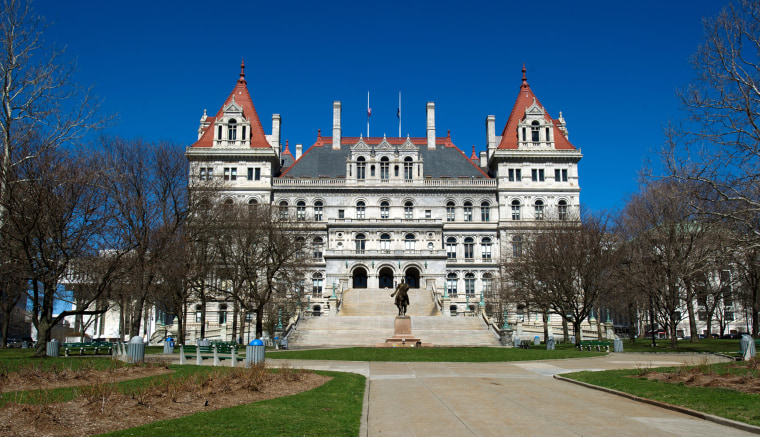The New York State Legislature is getting its first task force to work on issues affecting Asian Americans and Pacific Islanders, elected officials announced this week.
Assembly Speaker Carl E. Heastie joined community leaders and elected officials, including New York’s only two Asian-American state lawmakers — Assemblyman Ron Kim and Assemblywoman Yuh-Line Niou — in the New York City borough of Queens on Thursday to kick off the Asian Pacific American Task Force.
Officials said the nonpartisan body aims to tackle a range of issues, from disease to mental health to poverty, that disproportionately affect AAPI communities.
It will also be open to state assembly members and senators who themselves are not AAPI. That includes those who represent districts with AAPI populations of 10 percent or more, Kim said. He expects the task force to have between 15 and 20 members.
“As a result of the Asian-American community lacking the representation in the public sector at the local and state levels, we need as much support to make sure that this community gets the resources that they deserve,” Kim, the interim founding chair, told NBC News.
Asians are the fastest growing racial group in New York, accounting for 9 percent of the state’s 19.7 million people, according to the state comptroller’s office and the Census. While New York City is home to most of the state’s Asians, some counties on Long Island and upstate also have sizeable AAPI populations.
Other states, such as California and Massachusetts, already have caucuses devoted to AAPI issues. Federally elected officials, for their part, have the Congressional Asian Pacific American Caucus, founded in 1994.
Organizers say the task force’s objective is to review and promote legislation and budget requests that have a direct impact on AAPI communities. It could help, for instance, in the fight to bring vital services to AAPIs in the area of mental health, an often stigmatized subject, and diseases like hepatitis B.
More than one in two people living with chronic hepatitis B is AAPI, making them 8 to 13 times more likely to develop liver cancer as a result of a hepatitis B infection, according to the Centers for Disease Control and Prevention.
“Diversity is a priority in the Legislature, and with the addition of the Asian Pacific American [Task Force], our legislative body is one step closer to reflecting the diversity of our state."
“When we look at the numbers, we see how startling some of these statistics are and how vital it is that we pay attention to what the numbers are telling us,” said Niou, the interim co-chair. “When the numbers change, priorities change.”
Kim explained that having a task force will let them invite advocacy groups and nonprofits up to the state capitol each week in a structured way to educate task force members on issues facing AAPIs.
“I think oftentimes hundreds of groups come to Albany and in disorganized ways they try to go door to door and talk to elected [officials],” Kim said. “And oftentimes members don’t remember or retain any of these topics.”
In addition to issues like mental health and poverty, Kim said he wants to raise awareness among state lawmakers about hate crimes against South Asians, including cab drivers who’ve been assaulted while on the job.
The Asian Pacific American Task Force joins the New York State Black, Puerto Rican, Hispanic & Asian Legislative Caucus, which was formed earlier. Its name was last changed in 2005 to include the first Asian Americans elected to the Legislature. That caucus was originally founded in 1966 for black and Puerto Rican state lawmakers.
Kim said his task force plans to work with the caucus since there are many overlapping issues affecting the Asian, Latino, and African-American communities.
He added that it’s also necessary for AAPIs to understand issues impacting the black and Hispanic communities. Those include an emphasis on criminal justice reform and raising the age at which offenders are charged with crimes as adults, Kim said. New York Gov. Andrew Cuomo signed “Raise the Age” legislation into law in April.
Kim and Niou also brought up the underrepresentation of AAPIs in government. As of 2015, just 2 percent of state lawmakers nationwide were Asian, according to The New American Leaders Project.
By contrast, Asians, Pacific Islanders, and Native Hawaiians account for about 6.6 percent of the total U.S. population, according to the Census.
In New York, Kim and Niou are the only two Asian-American elected officials currently in the state Legislature. Both serve in the Assembly — the Senate has no AAPIs.
“Diversity is a priority in the Legislature, and with the addition of the Asian Pacific American [Task Force], our legislative body is one step closer to reflecting the diversity of our state,” Niou said.
Follow NBC Asian America on Facebook, Twitter, Instagram and Tumblr.
